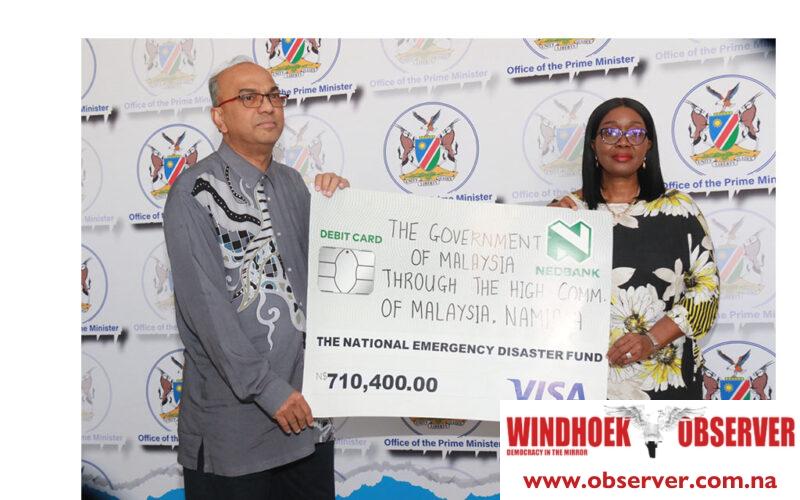Niël Terblanché
Namibia’s ongoing battle against severe drought received a vital boost this week with the Government of Malaysia pledging N$710 400 towards the country’s Drought Relief Programme.
The funds, presented to Namibia’s Prime Minister, Dr Saara Kuugongelwa-Amadhila on Monday, come at a critical time as the nation grapples with the effects of prolonged drought, which has been declared a national disaster.
Kuugongelwa-Amadhila expressed deep appreciation for the Malaysian government’s support, describing the donation as “the right shot at the right time” for a nation in dire need.
She assured the acting High Commissioner of Malaysia to Namibia, Dr Mohamad Rameez Yahaya, that the funds would be directed towards assisting the most vulnerable segments of the population, particularly those suffering from the severe impact of drought.
“This donation will help alleviate the suffering of those most affected by the drought, particularly in regions where malnutrition is a growing concern,” she said.
The prime minister stated that the government’s focus is not only on immediate relief efforts but also on implementing long-term strategies aimed at fostering drought resilience in Namibia.
The declaration of a State of Emergency on 22 May by President Nangolo Mbumba brought home the severity of the drought crisis, prompting both local and international calls for support.
According to Kuugongelwa-Amadhila, Malaysia’s timely contribution is seen as a response to this urgent appeal while also reinforcing the international community’s commitment to helping Namibia mitigate the impact of the drought.
In addition to the Malaysian support, the Government of Japan donated N$9 million through the World Food Programme (WFP) to bolster Namibia’s Drought Relief Programme less than a week ago,
Kuugongelwa-Amadhila said last week that the Japanese funds will provide complementary nutrition support to drought-affected communities, particularly in the Kunene and Ohangwena regions, where 4 426 households, or approximately 26 555 people, including children, are at risk of malnutrition.
Receiving the Japanese donation on behalf of the Namibian government, Kuugongelwa-Amadhila expressed her gratitude to both the people of Japan and the WFP for their continued partnership and support.
She also reaffirmed the government’s commitment to ensuring that all relief efforts are effectively targeted at those most in need.
“Working with our implementing partners, the government will ensure that this support reaches the most vulnerable people. The food assistance under the drought programme is not universal but targeted to those identified as most at risk,” she said.
According to Kuugongelwa-Amadhila, Namibia’s drought response has garnered significant international attention, and the contributions from both Malaysia and Japan reflect the global solidarity in tackling the crisis.
She reiterated the Namibian government’s commitment to improving its drought resilience strategies to safeguard against future occurrences of such severe climatic events.
“We are working tirelessly on long-term solutions to ensure that Namibia is better prepared for droughts in the years to come,” she said.
She added that these strategies are designed to mitigate the devastating impact of drought on the country’s agricultural sector and communities, which rely heavily on subsistence farming and livestock.
According to Kuugongelwa-Amadhila, the contributions of the international community will play a vital role in ensuring that no Namibian is left behind.




